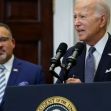Federal judges in Kansas and Missouri temporarily blocked a key component of President Joe Biden's latest attempt to forgive student loan debt. The Saving on a Valuable Education (SAVE) plan, designed to make debt repayment more affordable for low- and middle-income borrowers, was set to take effect on July 1 but will now be paused pending further court decisions.
The court orders issued on June 24 mean that millions of borrowers will not see their undergraduate loan payments cut in half as planned. Additionally, many will lose eligibility for debt cancellation, which was set to be implemented in waves based on income levels. The program will remain on hold while the courts consider legal challenges.
White House press secretary Karine Jean-Pierre announced that the Justice Department intends to appeal both decisions. Despite the injunctions, the SAVE plan still aims to lower monthly payments for millions of borrowers and provide relief for those whose debt balances have risen due to unpaid interest.
This setback for the SAVE plan echoes the fate of Biden's previous student loan forgiveness proposal, which the Supreme Court struck down last June. According to the White House, approximately eight million borrowers are currently enrolled in the SAVE plan.
What is the SAVE Plan?
The SAVE plan is part of Biden’s broader initiative to offer a second chance at loan forgiveness to as many as 30 million Americans with student debt. It targets borrowers whose loan balances have ballooned due to accrued interest, aiming to cancel up to $20,000 in student debt for those making less than $125,000 annually.
Following the Supreme Court's rejection of the initial plan, President Biden directed the Education Department to develop regulations for an alternative debt relief path using a different legal authority. The administration argues that it can forgive student debt on a large scale through executive action without needing explicit Congressional approval.
Court Challenges and Political Responses
The rulings from the federal judges in Kansas and Missouri were prompted by lawsuits filed by Republican state attorneys who claim that Biden is overstepping his powers. Under the SAVE plan, borrowers with undergraduate debt would have seen their loans cut in half starting July 1. This forgiveness measure is now paused until the courts rule on the Kansas lawsuit.
The Education Department is reviewing the judges’ rulings and their implications for the SAVE plan. Borrowers can still enroll in the plan, and provisions that lower monthly payments and provide interest relief remain in effect. Education Secretary Miguel Cardona assured that millions of borrowers will continue to benefit from lower monthly debt payments despite the injunctions.
Potential Supreme Court Involvement
The injunctions increase the likelihood that the legal challenges to the SAVE plan could reach the Supreme Court. The central question is whether Biden is overstepping his authority and misinterpreting the Higher Education Act, the legal basis for the new proposal.
Impact on Borrowers
If the SAVE plan is implemented, it will provide substantial relief for borrowers whose loan balances exceed their initial borrowed amounts. The plan proposes to cancel up to $20,000 in unpaid interest for qualifying borrowers, with individual income caps of $120,000 and $240,000 for married couples. It also aims to forgive debt for those who have been repaying undergraduate loans for 20 years or graduate loans for 25 years.
The proposal includes provisions for forgiving loans taken to attend institutions that were ineligible for federal student-loan programs or denied recertification. Additionally, borrowers facing financial hardship or at risk of defaulting would benefit from the plan.
Application Process and Eligibility
Most relief under the SAVE plan will be automatic, though some borrowers may need to provide additional information to qualify. Borrowers currently enrolled in the 2015 Revised Pay As You Earn (REPAYE) plan will be automatically transferred to SAVE. New applicants can enroll through the Education Department’s Federal Student Aid website.
The Biden administration’s broader student debt forgiveness efforts have already canceled over $145 billion in loans for four million Americans, including public-service workers, long-term borrowers, and those misled by for-profit institutions.






